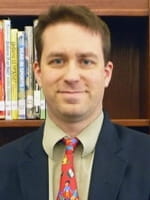Dr. John DeGarmo ’12 explains how becoming a foster parent helped fuel his passion to effect positive social change for children.

Dr. John DeGarmo
Dr. John DeGarmo ’12 is a foster care veteran. In addition to caring for their own three children, he and his wife have fostered more than 30 children. Why does he do it? For the small joys, critical breakthroughs—even the simple smile—that occur with each child, he says.
“We had a child who was burned by his mother with cigarettes,” he explains. “She caused so much pain in his life that it took us months to elicit a smile. And that smile was a tremendous breakthrough.” The DeGarmos have also watched as a child’s birth parents got off drugs, went through recovery, and worked to regain their parental rights. “Ideally, that’s how it should be,” he says.
When the alumnus entered the Doctor of Education (EdD) program at Walden in 2008, he knew he needed to use his doctoral study to positively affect everyone involved in the foster care system. “I created a seminar for foster parents, teachers, and case workers to work together to learn and understand the process and collaborate,” he explains.
To follow up on his doctoral work, he published Fostering Love: One Foster Parent’s Journey (CrossBooks, 2012) and The Foster Parenting Manual: A Practical Guide to Creating a Loving, Safe and Stable Home (Jessica Kingsley Publishers, 2013) to share his experiences and recommendations.
What does it take to be a foster parent? Find out if it’s right for you:
Discuss fostering with your family. “Foster children need stability, safety, security, and a family that will love them unconditionally,” DeGarmo says. Sit down with your family to discuss the possibility.
Contact your local foster care agency to start training. In training, you’ll learn the basics: what to expect and how to prepare your home. Search the “National Foster Care & Adoption Directory” to find an agency near you.
Realize fostering may lead to unexpected rewards. Not only will you provide a stable, loving home, you may ultimately watch birth parents change their lives for the better or help a child be adopted into a loving home.
Not sure you want to become a foster parent? Anyone can reach out to help:
Offer baby-sitting services. Become a certified respite care provider and connect to foster families. You’ll be able to offer foster parents a coveted date night.
Become a mentor. “These children need encouragement, ” DeGarmo says. Volunteer to teach young adults how to balance a checkbook, fill out a job application, or learn to cook. An hour a week makes a big impact.
Create a drive to collect suitcases. “When a child arrives into a foster home, they come with a black plastic bag,” DeGarmo explains. “We love to send them out with a brand new suitcase and a sense of pride.
“I wouldn’t be where I am right now, writing books and attending speaking engagements, if it wasn’t for what I learned at Walden,” says DeGarmo, who presents about foster care across the country. “My goal is to effect positive social change for foster children.”



